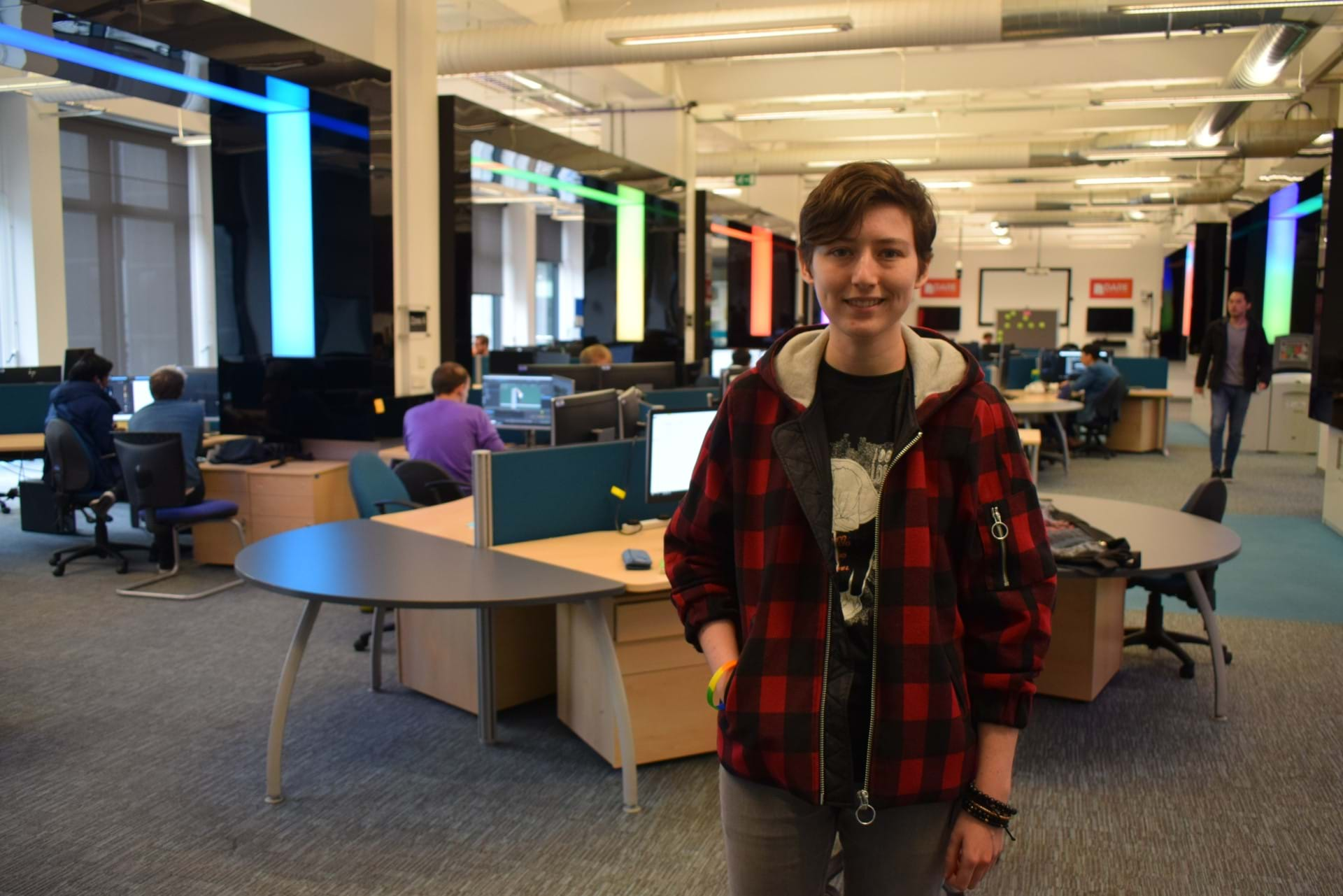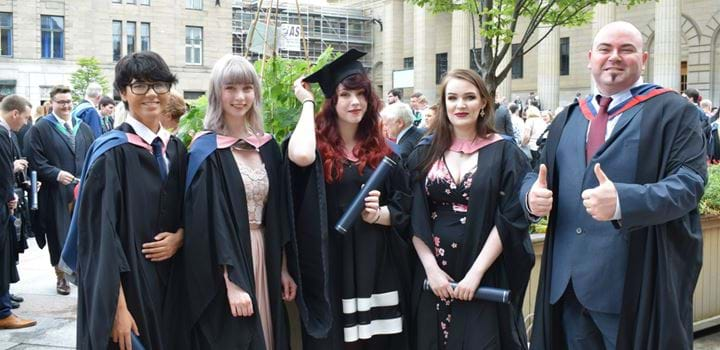Pause carousel
Play carousel

"My first year post-graduation has flown by! I’ve had a fantastic year working full-time as a character artist at Pocket Sized Hands. Being able to do what I love and make games and art for a living has been a dream come true. In what feels like a very short space of time, I’ve learned and grown so much, both as an artist and as a person.
Before I graduated, I was worried about having time outside of work to make my own art and work on personal projects, but since settling into working full-time I’ve been able to balance my personal work with my job really well. I’m looking forward to seeing how this informs the development of my art going forward, and also using that to make the exciting stuff we’re working on at Pocket Sized Hands even more incredible!"
I can’t imagine what it must be like to be finishing university in these circumstances – to the graduating class of 2020, you should be extra proud of yourselves for making it here. Things might seem uncertain right now, but don’t be afraid of what comes next. You’re moving into new, uncharted waters now – embrace that change!
What are your long-term career aspirations?
My overall goal is to work as a character artist in the game industry, in a studio where I am able to specialise to this level. I’d like to have a senior-level role, where I can use my skills and experience to help others but still spend the majority of my time at work making character art.
How will your next steps contribute towards these aspirations?
I plan to continue working in my current role for the time being – I’m an artist at Pocket Sized Hands, a small game studio here in Dundee. I’ve been working here since June 2018, when I landed an internship at the studio, and was then hired part-time during my 4th year of university. Now that I’m done with university, Pocket Sized Hands have hired me full-time! Ultimately, I’d like to move to a bigger studio where I can specialise into character art. I plan to work on my character art portfolio in my time outside of work in order to help me build towards this.
What approach did you take to researching your career path and industry?
Honestly, almost all of my knowledge and research into the game industry has come from just talking to people who already work in it. Events like EGX and the Game Developers Conference, which I was fortunate enough to attend through Dare Academy, have been really useful in that they’ve allowed me to get some first-hand insight into what it’s really like to work as a game developer at a variety of different types of studio. These events often also have scheduled talks from industry professionals, which can be a great way of learning about current trends and new techniques in the industry, and these talks are usually posted online, which is great as the events can sometimes unfortunately be expensive and difficult to attend in person. And of course, Abertay is filled with industry veterans who are full of knowledge and experience to share!
How are you feeling about everything?
Relieved – as I’m fortunate enough to have a job in the game industry in place before graduating, which is a huge weight off my shoulders!
Excited – the game industry is very fast-moving and I can’t wait to see which direction it takes next, especially now that I’m finally beginning my career in the industry.
Nervous (but only a little bit) – of course there’s no way of knowing what the future holds, which is mostly exciting but also a bit scary. I really do have no idea what twists and turns my career might take!
You thought it would take a few years to secure this role title as competition can be fierce. How does it feel to be working in your ‘dream role’ immediately after graduation?
It still hasn’t sunk in - I genuinely did expect to be working in games for years before I got the role of Character Artist. Character art is definitely one of the most competitive fields of game art, as it’s something that a lot of people love doing, but it’s also something that there aren’t really a lot of jobs for, especially in terms of junior/graduate roles. In a way (and I know it’s silly), it does feel a little bit like I cheated, as I was hired as a general artist at Pocket Sized Hands when I started in 2018 and then my role was changed to Character Artist when I went full-time, so it’s like I skipped that super-competitive stage of trying to get hired directly into a character art role. Moving from a general role into character art is actually a really common theme amongst character artists though, so I’m still pretty proud of myself!
What does a Character Artist get up to day to day?
We make characters! The specifics of that depend on the studio really - as our team is really small (we have 3 artists total at the moment), I have to cover pretty much the whole game character art pipeline. I do 2D concept artwork, to explore and nail down the character’s design, then I go through the whole process of transforming that design into a 3D character model that can be used in a game, which is kind of comparable to clay sculpting, but digitally. The more technical steps involve texturing, which is what gives the character models colour and other properties such as roughness/glossiness, and rigging, which involves the creation of a ‘skeleton’ for the character that can be manipulated by animators to create animations for the character. At bigger studios, these tasks might be delegated to different people, but in our little team it’s all my responsibility.
Working at PSH, you get to work on both client and in-house projects as part of quite a small team. Is this something you enjoy?
Yes! We tend to do a lot of different short-term projects, which is fun because it means we get to change up what we’re working on quite often so I don’t get bored or tired of working on the same thing for ages. It also means I get to learn a lot about really random topics - for example, we worked on a mobile game about stem cell biology for the University of Cambridge, so I now know way more about stem cell labs than I ever thought I would. Aside from short-term client projects, for a few months now we’ve also been working on our own original game in the background, which has been very exciting. I’ve been doing a lot of visual development and concept work for it and it’s a really amazing experience to get to have this much of an impact on what is hopefully going to be our first big original game release!
PSH has recently been working on a really interesting project with Northumbria Police. Can you tell us about this project?
So we did a really interesting VR project with Northumbria Police earlier this year that we finished up around June, which was an experience aimed at raising awareness and training users how to spot red flags and recognise people who might be vulnerable in different potentially dangerous situations. It was definitely one of the more high-profile projects we’ve done - we were even interviewed by BBC News about it! - and Northumbria Police have decided to continue working with us and are commissioning another VR experience from us. This new project aims to tackle knife crime by dissuading young people from getting involved in knife culture. It’s pretty heavy stuff, but it’s something that we’re hoping will really have an impact on the people who play it, and we’ve been working with knife crime charities as well as the police to make sure we handle the topic properly and carefully. This is another fairly short-term contract so we should be finished with it within the next few months, after which it’ll be taken into schools and workshops to be played.
We offer professional support to our graduates for up to three years after graduation. Explore what resources are available to you, and how you can tap into these when you need them.

Our Careers Service offers guidance and support to our graduates for up to three years after graduation.

It may not be the obvious time to start a business, but it’s definitely still possible. Explore what support is available to you.